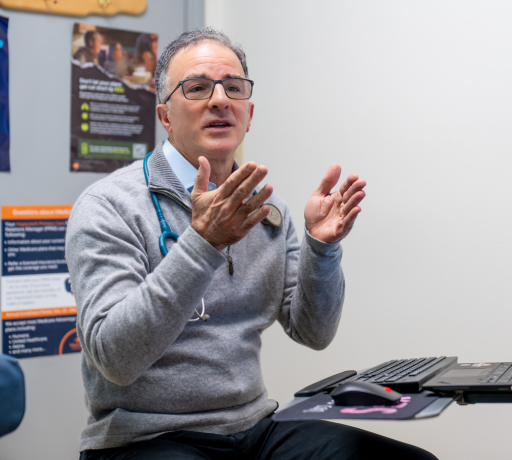
With age comes wisdom. “Youth is wasted on the young,” they say. Older adults can draw from their life experiences to make decisions and account for factors younger people may fail to consider.
Older adults deserve a partner to help them make optimal healthcare decisions. Navigating the healthcare system as a senior can be confusing. It’s nice to know you’re not alone.
You are the expert on you, but it helps to have someone in your corner to guide you in understanding your options for care and to support you on your healthcare journey.
Wouldn’t it be great if that person also had a wealth of experience and knowledge to draw from to assist you in achieving your wellness goals and making your most informed health decisions?
Dr. Patrick Contino is a true Renaissance man. His rich life experiences, unwavering curiosity, and deep belief in lifelong learning inform and empower his holistic approach to medicine.
We are honored to have him on our Hopscotch Primary Care team. Dr. Contino is part of the outstanding team at our Hopscotch clinic on Brooklet Street in Asheville. We were thrilled to connect with him recently to learn more about his life and philosophy of care.
Discover what he had to share in our wide-ranging interview:
7 Questions with Dr. Patrick Contino (MD) of Hopscotch Asheville—Brooklet
Hopscotch:
Thanks so much for setting aside the time to chat today, Dr. Contino! After reading your bio, we’re excited to learn more about your history, approach to care, and personal philosophies. Let’s dive right in!
You were drawn to a medical career from personal experience. How has your decision to pursue medicine shaped your life? Would you still make the same choice today?
Dr. Contino:
I would definitely make the same choice. I wake up every day and can’t wait to get in the car to go to work. That’s a good thing.
Some people would boil down their purpose in life to giving to others. For me, it’s to give care and also to learn to appreciate the value of that. I want people to have a good experience and I want to share that good experience with my patients.
In terms of how medicine has shaped or changed my life, I think it’s made me more self-aware. That’s number one. As providers, it’s important to acknowledge that our own biases and nuances that we take into the exam room ultimately impact our assessment of a patient and what we recommend. Trying to put yourself into the patient’s shoes and see things the way they do is a continual challenge but a necessary one.
When you translate that into personal life, it’s the same thing. We all look through our own lenses. Being self-aware and slowing down and accepting others’ input without disowning your own opinion is, I think, the way to go. This can apply to any interaction we have in life.
Medicine, in general, teaches critical thinking. But it doesn’t do as good of a job in enforcing the importance of self-awareness or teaching us to explore other ways of addressing issues that come up with our patients. That’s why having other professionals with different opinions and backgrounds is so important.
I also try to bring aspects of Eastern medicine to what I do, such as principles of yoga and meditation. I believe it’s important to continue to learn and take in new awareness and knowledge continually throughout your career.
Both in my personal and professional life, it really comes down to valuing being self-aware and a lifelong learner. Those are probably the two things that make my work fun and my family life even more enjoyable.
Hopscotch:
In your bio, you mention the importance of lifestyle medicine in your holistic approach to care. Explain this term and how you apply it in the care you provide.
Dr. Contino:
Lifestyle medicine is a new specialty. You can actually get board certified in it now.
Lifestyle medicine providers are focused on promoting healthy lifestyles. That includes things like the importance of sleep, regular exercise, and different types of exercise (such as to build strength and decrease stress). It also includes things like diet and nutrition, which are incredibly important. There’s no one specific diet, but the literature in recent years suggests that a plant-based diet or Mediterranean diet (based on the Blue Zones) can help protect the cells and promote healthy aging.
This weaves into the anti-aging craze and how we can look at new science to support this. Many researchers have interesting views about how we can turn back the clock on aging with their teachings. I listen to a lot of researchers and providers and get information on their thoughts and ideas. I try to keep up with anti-aging medicine because I think it will become a specialty soon.
Emotional health and relationships are also important. How we interact with others is vital to our health and well-being.
There’s also a lot of literature about the habits of effective, healthy people. They look at having a sense of spirituality, financial and cognitive health, mental health, and how you stimulate your mind.
Then, at the clinical level, we get into the social determinants of health. Things like food, housing, transportation, and education level have a significant impact on someone’s overall health and are factors we consider.
That’s why having a clinic like ours that emphasizes these aspects of health and wellness is so important. We do that with people like our Community Health Workers and nurses, who can go out to patients’ homes and identify issues at that level that maybe we can’t envision or account for.
That’s my once around the world with lifestyle medicine. I look at it as being self-aware of your own emotional and physical health, and looking at these other parameters that contribute to our overall health and well-being. If you’re looking at those things, you’re lining yourself up to prevent illness or keep it from reaching a more severe state.
Hopscotch:
You mention your experience with multiple cultures. How does this awareness come in handy in your current role?
Dr. Contino:
In Germany, I was in US military-based clinics and hospital settings. We did have some spouses who were natives of Germany and other cultures. So there was more diversity there in terms of international patients and cultures. You’ve got different value-based systems and systems of healthcare. International healthcare systems are largely socialized health. When you go to Europe, they consider health insurance a right for individuals. But, if you look at Medicare in this country, that’s also a social health product.
For people from Latin American cultures, family and spirituality are very important and central to their lives. This adds to the contention that it’s critically important to not only investigate a patient’s physical health but to also understand what goes into their decision-making process about health. Maybe they look to a grandparent or spiritual leader.
An American who hasn’t been exposed to other cultures may make judgments about other’s decisions that may not be accurate. My exposure to other cultures has informed me about the need to be self-aware and to postpone judgment and acknowledge that there’s not always just one right answer. There’s not only one way to go about managing a problem or an issue.
Hopscotch:
A couple of months ago, hurricane Helene greatly impacted the Asheville area. How has the hurricane affected your clinic and the needs of your patients?
Dr. Contino:
The way that they’ve been affected is multifaceted; many people’s homes, cars, livelihoods, and finances were impacted by the storm. This fits into those social determinants of health we discussed earlier. The hurricane had a significant impact on our social determinants of health. Not to mention folks whose homes flooded and it ruined their medicines and they couldn’t get to the pharmacy or were out of running water and couldn’t get food.
The storm occurred about three or four weeks before I joined Hopscotch. So, when I came on board, everything was still very fresh and I was very well aware of what had just happened and how Dr. Curran and providers from other Hopscotch clinics helped out in any way they could in Western North Carolina.
We provided free-standing outdoor medical assistance. FEMA came in and provided bottled water and other types of support. Especially early on in a disaster situation, it’s very important to have good water very quickly.
I think there was a very rapid federal response and the providers from this clinic and other Hopscotch clinics provided excellent rural-type care. And that’s really our mission: to enhance the care to patients in rural communities through access to quality care. They took that mission and transported it outside of our brick-and-mortar locations and offered it to the communities.
Going forward, our providers must continue to be aware of how this event impacts overall health. There’s a big emotional piece to it, too. Everyone here experienced trauma, which can affect everything from sleep to relationships to the ability to maintain gainful employment and on and on.
I think the community here in Western North Carolina has come together as a whole, and we’re very proud to be a part of that. We provide for communities in need, so we cross over to other clinics to offer help if necessary so we can provide a community response. I’m proud of the work that’s been done and proud to be a part of this organization and hope we can continue to help others as best we can.
Hopscotch:
Why is a team-based approach to healthcare for seniors important?
Dr. Contino:
A person’s overall health is determined by several factors; not just physical factors, but also things like finances, housing, food, transportation, and education. We, as providers, are limited, largely by time but also by our specialties in terms of our ability to bring all of those aspects into one area. Having a team that is mobile in the community and within the clinic that collaboratively shares information is vital for patient health and experience.
If someone comes into the clinic and is having a hard day, the Welcome Coordinator is going to let the Medical Assistant know who will let the provider know. That way, when I walk into the room, I know what’s going on. There’s a very easy flow of information in the team that imparts a benefit to the patients. It’s collective intelligence. If you’re given a problem to solve, it’s better to give it to ten people to solve it than two.
The team here allows me to take more time with my patients because of their support. Plus, there’s the access and other support we offer, such as home visits and telehealth. We can provide patients with access because of that team care. This type of care is shown to reduce hospitalizations and emergency room visits in seniors.
It’s all part of the mission of providing quality, accessible care that leads to better outcomes. And you have to have a team to do that. We keep an eye on the big picture. I enjoy the team-based approach and it’s a big part of the reason I joined Hopscotch.
Hopscotch:
How does your experience working for WNC Community Health Services inform your approach to caring for the area’s seniors with Hopscotch?
Dr. Contino:
A large percentage of patients at Minnie Jones Health Center were uninsured. So, there were obvious stressors the majority of them faced under the category of social determinants of health.
The senior patients I saw there did have Medicare, which likely helped reduce this to some extent. But they did struggle with getting to the clinic. Some had behavioral health issues that led to them not getting the healthcare they needed until their Medicare benefits kicked in.
Taking that experience and applying it to my current environment, I think it gets back to being mindful of what our patients bring to the table. Most of the common chronic health issues seniors face are fairly straightforward. But, just because it’s not difficult to figure out someone’s diagnosis doesn’t mean it’s not important to listen to them and understand their history. I always say that when you’re struggling with figuring out what’s going on with a patient, you need to go back to their history.
With my experience as a provider in caring for the elderly at all stages of my career, I think there’s a special part in everyone’s heart as we age that makes us increasingly aware of our own mortality. It’s a privilege and a joy to age. It’s even more important for me to make sure people know that I share in that humanity and I care for them. I want to know about my patients because it really does make a difference in terms of what I recommend they do.
I challenge myself and my patients to think about different ways than maybe they’ve been told before about how they want to manage a particular issue or problem.
I’m grateful to be here, that I’ve had the experiences that led me to where I am now and that I’m able to use them to serve our community.
Hopscotch:
You mention the importance of being a lifelong learner. Why is staying curious and open to new knowledge and experiences important, especially as we age?
Dr. Contino:
When we think about the world in general, there are a few things that will always happen: you’ll always have taxes, you’ll pass away, and things are always going to change.
When we’re young, we don’t even think about it too much. We take it for granted that change is just a part of life. But, when you get into your 50s and 60s, you consider your life expectancy more and you begin to care more about your health and your relationships.
It also becomes a bit more challenging as we age to adjust to the increasing speed at which things are happening. With things like technology, you’re not going to be able to stay current with everything new.
Eventually, we get tired of changing. But, once you stop adapting, that makes life more difficult. There’s a military quote about “adapt or perish.” You have to anticipate and constantly adapt to the new situations out there.
The way I apply that as a provider is to realize that I must learn new things. Fortunately, I want to and enjoy learning new things. It’s not just about survival; it’s about knowing that once I learn new things, I can plant the seed of new information and data with my patients.
Medicine is always changing and evolving and I want to stay on top of that. Convincing people that change is necessary and continuing to listen to people and learn from them is, to me, part of lifelong learning. It’s about being aware of your surroundings, adapting, and doing what you need to do to take care of yourself and those who are most important to you.
It doesn’t mean you need to read a book every night, but it’s about being open to learning experiences. I hope that some of my last thoughts on Earth are questions. Since I don’t know when that time will be, I get practice by asking questions all the time.
Are you interested in becoming a patient of Dr. Contino and partnering with him in his mission of lifelong learning and holistic health and well-being? You’ll find him at our Brooklet St. location in Asheville, where he and the team are waiting to offer seniors the comprehensive, personalized primary care you deserve to feel your best in WNC.
Become a Hopscotch patient easily online, find your nearest clinic location and contact info, and drop by our blog regularly for free info and resources to support senior health and wellness!

